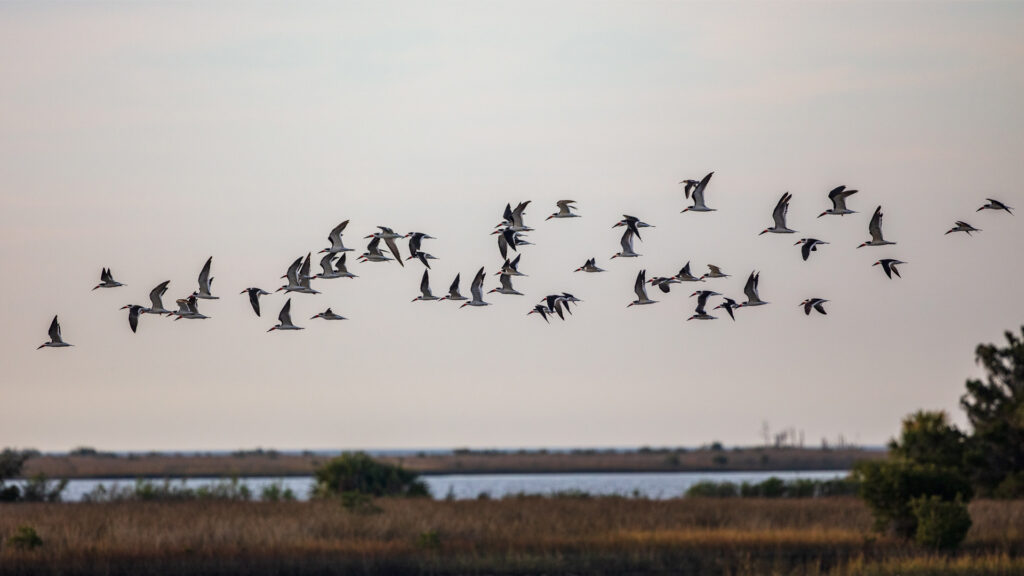By Julie Wraithmell, Audubon Florida
While Miami slept on any given night this fall, so many birds migrated overhead that they were regularly visible on weather radar. More than half of America’s birds make the journey to Latin America and the Caribbean and back each year, everything from tiny hummingbirds to globetrotting shorebirds, powerful peregrine falcons to jewel-colored warblers and orioles. Florida funnels this river of North American birds each fall, and watching their passage is one of our state’s greatest natural spectacles.
It is only natural to think of the birds that we see in our back yards and communities as our birds, but in reality, they are only on loan to us. Many of these species spend their lives in motion, moving like tides back and forth across the hemisphere every year.

Unfortunately, this annual spectacle is dimming — North America’s bird population has declined by 3 billion since 1970. That’s more than a quarter of all birds lost in less than a lifetime, most of them migratory species that journey thousands of miles each year.
Their global migration is made possible by a connected chain of habitats that act as stepping stones from their breeding to their wintering grounds — stepping stones that these birds have depended on for thousands of years. But like any chain, it’s only as strong as its weakest link. Ensuring the future of this spectacle and these species requires that each link is protected. The good news is that we have tools to better protect these species and begin reversing their losses, if we act internationally, across their full migratory ranges.
In a time when agreement is scarce in the nation’s Capitol, the Neotropical Migratory Bird Conservation Act (NMBCA) program is a rare instance where both major parties have worked together since 2002 to provide funding and partnerships for conserving more than 350 species of birds — especially in sites where birds stop and spend the winter in Latin America and the Caribbean.
The program, which is up for renewal, is one of the smartest ecological investments we can make. Since 2000, more than 700 of these projects covering more than 5 million acres of habitat have helped birds in 43 countries. But each year, the program receives far more applications than it has resources, leaving many important projects left unfunded.
NMBCA projects in Latin America tend to be modest investments with outsized benefits that become catalysts, further attracting international matching investments. For every $1 provided by the U.S. government, $5 is spent on conservation, totaling more than $346 million in partnership funding.
Saving birds isn’t just a pretty idea, it also strengthens our economy. A recent Fish and Wildlife Service survey found that more than 96 million people in the United States participated in birdwatching in 2022 — and consumer spending on bird feeding, birdwatching equipment and travel creates more than $100 billion in economic output every year. Without healthy bird populations, this economic engine falters.

Healthy bird populations are also critical to our ecosystems. We all rely on birds to control pests, disperse seeds, pollinate fruit and flowers and perform other critical functions that make the natural world work. People’s quality of life and prosperity depend upon the health of our environment. Better conditions for birds deliver improved conditions for people, too.
Legislation to renew support for these programs has been introduced in Congress by a bipartisan team of legislators, including Miami Republican U.S. Rep. Maria Elvira Salazar. In addition to strengthening funding for the program to meet current interest and demand, the Migratory Birds of the Americas Conservation Enhancements Act would make critical improvements to boost the effectiveness of every dollar spent and increase access of the grant program to smaller organizations.
Supporting this legislation does more than just protect the birds that so many of us, including 2 million Audubon members in the United States, have come to love. From the Arctic to the Amazon, what threatens birds threatens all of us.
Congress should reauthorize and enhance this program to meet this moment. To continue to enjoy birds at home, we must protect them hemispherically, so that “our” birds return again each spring.
Julie Wraithmell is the executive director of Audubon Florida. This opinion piece was originally published by the Miami Herald, which is a media partner of The Invading Sea.
If you are interested in submitting an opinion piece to The Invading Sea, email Editor Nathan Crabbe at ncrabbe@fau.edu. Sign up for The Invading Sea newsletter by visiting here.



